Dentures – Houston, TX
Rebuilding Your Smile For the Better
When it comes to replacing missing teeth, it should come as no surprise that the prosthetic most people turn to is dentures. At Downtown Houston Dental, we are pleased to provide our patients with natural-looking, fully functional, and long-lasting prosthetics. Using only the best materials, we can ensure a proper fit that will feel comfortable inside your mouth and allow you to enjoy normal daily tasks that were once challenging to complete. Call us today if you think you might be a good candidate for dentures.
Who is a Good Candidate for Dentures?

Good candidates for dentures are those individuals who are missing either a full arch of teeth or several in a row. Partial, full, and implant dentures are all viable options depending on the status of your oral and overall health as well as your jawbone density.
During a scheduled consultation, a member of our team will examine your smile to determine which option is right for you. But before moving forward with dentures, we’ll need to make sure there are no signs of periodontal disease or tooth decay. Otherwise, we’ll need to administer appropriate treatments to better prepare your mouth for stable prosthetics.
Effects of Missing Teeth
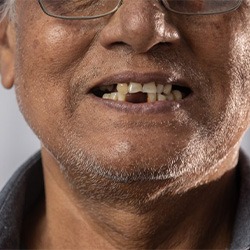
Living with missing teeth can lead to a range of oral health problems as well as diminished self-confidence. Tooth loss can allow the remaining teeth to drift out of alignment, making them harder to clean, easier to injure, and more likely to become infected, which can potentially lead to a vicious cycle of tooth loss. As the jawbone continues to recede, the patient may notice issues like facial sagging, speech difficulties, trouble eating, and lower self-esteem.
Rest assured that our team will thoroughly explain the recommended treatments as well as their estimated costs before we begin. That way, you won’t be faced with any unpleasant surprises.
What Qualifies You for Dentures?

Dentures can be an excellent option for patients who deal with extensive tooth loss, sensitive teeth, or severe dental decay as long as they have sufficiently healthy gums and jawbones and are willing to commit to proper oral hygiene and denture maintenance.
The number of teeth missing ultimately determines which type of denture is best for you. A partial denture can replace one or several lost teeth and holds itself in place by clipping to your natural smile with metal wires. Full dentures, on the other hand, are designed to replace a whole arch of teeth and hold their place with natural suction. Implant dentures are anchored to titanium posts placed directly in the jawbone, providing the most secure hold possible along with maximum chewing power.
Alternative Tooth-Replacement Options
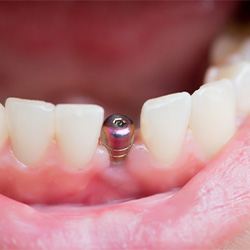
While dentures have allowed many people to achieve complete smiles after tooth loss, there are other tooth replacement options available. A few of these include:
- Dental bridges: Traditional bridges consist of one or several artificial teeth strung between two crowns. For a bridge to be placed, Dr. Johnson will have to remove a small amount of enamel from healthy teeth on either side of the empty socket(s) and anchor these crowns on top of them. This can be a great treatment for those who are missing one or several sequential missing teeth.
- Dental implants: Dental implants are considered the pinnacle of tooth replacement because they look, work, and feel just like real teeth. They consist of a titanium post surgically placed in the jawbone, a lifelike dental crown that serves as the tooth, and an abutment piece connecting them together. While implants are more costly than dentures, they may last for a lifetime with excellent care.
- Implant bridges: An implant bridge uses dental implants placed on either side of a gap to hold its place in the mouth rather than crowns placed on healthy teeth. This creates a sturdier hold for more vigorous chewing without altering sound dental structure.
Types of Dentures

At Downtown Houston Dental, we offer three types of dentures to our patients:
Partial Dentures
Using a gum-colored base made out of acrylic as well as artificial teeth and metal clips, this unique prosthetic works like a puzzle piece, fitting into the areas that are missing teeth. The clips attach to natural, healthy abutment teeth so that the denture will remain firmly in place when eating or speaking.
Full Dentures
Made similarly to partial dentures, the real difference between full and partial dentures is how they remain in place. Instead of using metal clips, full dentures require the use of your natural suction and denture adhesive to help hold them steady. They’re also made to replace a full row of teeth in the upper or lower arch.
Implant Dentures
For a more permanent solution, you can always opt for implant dentures. However, you must have enough jawbone density to adequately support these titanium posts that are surgically implanted into your jawbone. Delivering a state-of-the-art, root-to-crown tooth replacement, they can last a lifetime with optimal care and maintenance.
How Dentures are Made
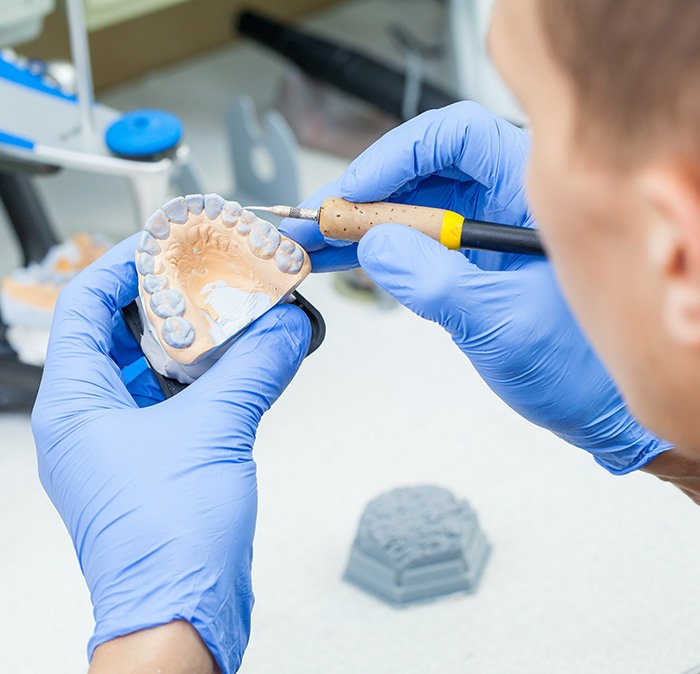
As you look into dentures, you’ll likely want to learn how they’re made. That much is natural – most patients prefer knowing what went into their replacement teeth. Fortunately, Downtown Houston Dental is here to explain the denture creation process to you. Our precise summary should help you feel confident and reassured that your new smile is well-made. Just keep reading to learn the relevant details, or call us for a chat!
What are Dentures Made Of?
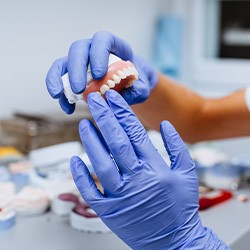
Every denture has two crucial parts, no matter the type: a base and artificial teeth. These items make up the bulk of the overall device, so it’s best to keep them in mind. Please consider them more fully below:
- Denture Base – By keeping the artificial teeth secure, a denture’s base acts as its foundation. This part is usually made of pink-colored acrylic, though other materials (especially nylon) can make for good substitutes.
- Artificial Teeth – A denture’s artificial teeth are its tooth-replacing parts. Dental labs make them from resin or porcelain so they match your smile’s overall color.
The Denture Creation Process
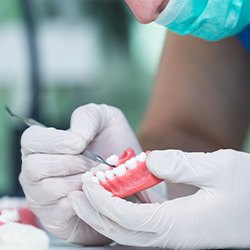
Because each denture is customized for its patient, making one involves a multi-step process. The crucial steps are:
- Step 1: Using a dental impression, Dr. Johnson will design a plaster model that matches your final denture’s size and shape.
- Step 2: A dental lab will use the plaster model to make a wax gumline based on your grin.
- Step 3: Once the wax gumline is ready, workers will set artificial teeth in it. They’ll then make a prototype denture.
- Step 4: Our practice will receive the prototype denture and check it against your mouth. We’ll send it back once we’ve confirmed its fit.
- Step 5: A worker will place the prototype in a flask after boiling it to remove wax. From there, the flask will receive plaster and sit in hot water.
- Step 6: A separator will go into the plaster layer and keep the acrylic from sticking. Next, this acrylic will be injected into the flask to replace the wax.
- Step 7: The dental lab will remove all plaster to reveal the final denture. Then, they’ll place the restoration in a bath to remove its residue.
- Step 8: The lab’s workers will remove your denture’s excess acrylic and polish its surface.
- Step 9: To ensure it works smoothly and easily, our office will fit your final denture for you.
Adjusting to Your New Dentures
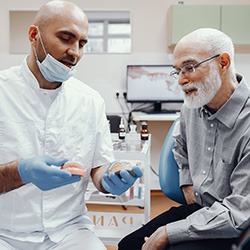
Admittedly, your mouth may feel sore while you adjust to dentures. This side effect is normal; you’ll need time to get used to your new teeth. The dentures will feel more familiar once you’ve practiced a bit.
Thankfully, you can take certain steps to adjust more quickly. One such action is to exercise your facial muscles; you’ll then have a mouth strong enough for dentures. Similarly, you could eat soft foods (to avoid irritated gums) or use special adhesives (to keep dentures in place). These and other methods would help your dentures feel natural very soon.
If you suffer persistent or worse denture pain, please call us. You may need further alterations to your new teeth.
Benefits of Dentures

The benefits of dentures are many, which is why so many people are eager to try them when recommended by a dentist. Some of the greatest advantages you can expect include:
- A complete smile that gives you the confidence you need to thrive
- The ability to eat nutrient-rich foods once again
- Prosthetics that can last for several years (partials and full dentures) or a lifetime (implant dentures)
- Improved jawbone stimulation to prevent facial sagging (implant dentures)
- Greater bite force and chewing power
